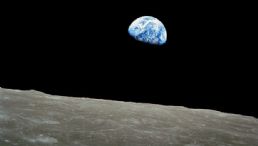
The United Nations Ocean Conference underlined the need for an integrated approach to the blue economy, one which supports jobs and livelihoods while conserving the environment. A new Blue Charter of principles for sustainable ocean development may be the answer, writes Commonwealth Secretary-General Patricia Scotland
Ours is a blue planet. The ocean, which covers more than two thirds of the Earth's surface, is home to an incredible variety of species. It is a source of sustenance, prosperity and sheer wonder for humankind.
Almost half a century ago, on 24 December 1968 aboard Apollo 8, astronaut Bill Anders took a photograph of the Earth rising above the surface of the Moon. Earthrise was the name given to this picture which captured the world's imagination.
The photograph remains one of the most profound images ever created, offering us a reminder of the planet's fragile existence: a jewel among a galaxy of stars and the only place in the universe known to host life. But for a predominantly blue world, Earthrise seems misnamed. I prefer to call it Oceanrise.
For millennia the ocean has blessed humanity with bountiful resources. In many coastal communities, small-scale fishing still provides families with their main source of food and income, while millions more rely on sectors including offshore energy, coastal tourism and maritime transport.
However climate change, overexploitation, pollution and inequity in the sharing of marine resources mean there are real risks to the future of those who depend on the ocean. Global fish stocks are under severe pressure with up to 90 percent either fished to full capacity or depleted through overfishing, while renewable offshore energy resources as well as deep-sea minerals remain untapped.
At the same time, despite accounting for a substantial proportion of the ocean workforce, the contribution of groups such as women and young people is often ignored in commercial decisions and public policy-making. This has an impact on their financial independence, social status and livelihoods.
All of these concerns underline why last week's United Nations Ocean Conference, the first of its kind, was so critically important. Co-chaired by the governments of Fiji and Sweden, the high-level summit at the UN General Assembly in New York was held to help countries chart a course to achieve the Sustainable Development Goals, in particular Goal 14 to "conserve and sustainably use the oceans, seas and marine resources".
The conference resulted in a call for action which aims to protect the oceans while also respecting the right of countries to sustainably develop their blue economy. At the conclusion, over 1300 voluntary commitments had been tabled, as governments and private and civil society partners outlined steps they are taking to make good on the vision of SDG 14.
It was especially encouraging to see the commitments lodged by Commonwealth member countries. The world is now on track to protect over 10 percent of marine areas by 2020. Countries are seeking to share innovative technologies, to give consumers greater choice in sourcing sustainable fish, to find a common approach to dealing with harmful subsidies, to eliminate harmful plastics and reduce sewage and pollution.
On behalf of the Commonwealth Secretariat, I was pleased to recommit our support to member countries especially vulnerable and small island developing states. I was also heartened to witness widespread support for our proposal to create a Blue Charter of principles for sustainable ocean development.
The Blue Charter will apply the values of the Commonwealth Charter - including democracy, good governance and the commitment to fairness and equity - to a regenerative model of sustainable development. It will marry the goal of unlocking economic value from the seas with the imperative of protecting the environment. It recognises that ocean wealth depends on ocean health.
Described by one government as a potential game changer, this accord will help countries across Africa, Asia, Europe, the Caribbean, Americas and the Pacific to develop an integrated approach to ocean governance. This means considering the needs of the smallest and most at risk nations and marginalised groups, including overlooked sectors such as artisanal fishing as well as women and young people.
The Blue Charter will complement the support already offered by the Commonwealth Secretariat to help countries manage their marine resources. For three decades, we have assisted more than 30 countries to claim their maritime territory under international law and to develop policy and legislative frameworks for the development of offshore renewables, petroleum and deep-sea mining, while ensuring the benefits of these industries are shared equitably.
Of all the inheritances we will pass on to future generations there is no greater asset than our ocean. Last week's Ocean Conference was about harnessing our shared determination and building successful partnerships in support of this lasting legacy. It is important to recognise however that we are only at the beginning of a journey which will require many hard choices ahead.
As Fiji's Prime Minister J.V. Bainimarama so ably expressed, "While Pacific nations rightly identify ourselves as stewards of the ocean in our own part of the world, we cannot save our waters on our own. And nor can the nations of the Caribbean or coastal nations of Africa. A collective global effort is required."
Just as it took incredible ingenuity, bravery and perseverance to mount a mission to the Moon, it will require the same investment to safeguard our blue planet, to move from a philosophy of explore and exploit to one of sustain and be sustained by. For the sake of the ocean and those that depend on it, we must rise to the occasion.